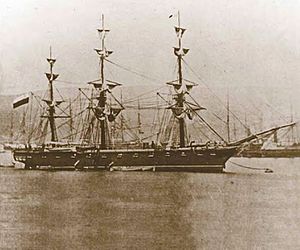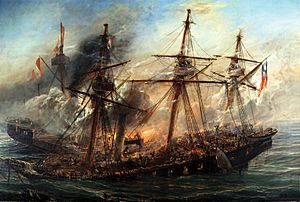Chilean corvette Esmeralda facts for kids
 |
|
Quick facts for kids History |
|
|---|---|
| Name | Esmeralda |
| Namesake | Esmeralda (1791) |
| Ordered | 30 June 1852 |
| Awarded | 23 October 1854 |
| Builder | William Pitcher, Northfleet, England |
| Cost | £23,000 |
| Laid down | December 1854 |
| Launched | 26 June 1855 |
| Commissioned | 18 September 1855 |
| Fate | Sunk, 21 May 1879 |
| General characteristics | |
| Type | Steam corvette |
| Tons burthen | 854 77⁄94 tons bm |
| Length | |
| Beam | 32 ft (9.8 m) |
| Depth | 18 ft (5.5 m) |
| Propulsion | |
| Sail plan | Full-rigged ship |
| Speed | 8 knots (15 km/h; 9.2 mph) (under steam) |
| Complement | 200 |
| Armament |
|
| Service record | |
| Commanders: |
|
| Operations: | |
The Esmeralda was a famous steam corvette (a type of warship) in the Chilean Navy. It was made of wood and launched in 1855. This ship became famous when it was sunk by the Peruvian ironclad Huáscar on May 21, 1879. This happened during a big naval battle called the Battle of Iquique, which was part of the War of the Pacific.
Contents
The Story of the Esmeralda
Building the Ship
The idea to build the Esmeralda was approved on June 30, 1852. This approval came from Chile's President, Manuel Montt, and his Minister of War and Navy.
A contract for building the ship was signed on October 23, 1854. It was signed by Chilean naval officer Robert Winthrop Simpson and shipbuilder William Pitcher in Northfleet, England. The total cost to build the ship was £23,000.
Construction began in December 1854. The ship was officially launched on June 26, 1855. It was named Esmeralda after an older ship captured by Thomas Cochrane during Chile's fight for independence.
Ship's Design
The Esmeralda's hull (the main body of the ship) was made of wood. Its bottom was covered in copper to protect it.
The ship was about 210 ft (64 m) long, not counting the bowsprit (the pole sticking out from the front). It was 32 ft (9.8 m) wide and 18 ft (5.5 m) deep.
It had four boilers that burned coal to create steam. These powered two steam engines, giving the ship a speed of up to 8 knots (15 km/h; 9.2 mph) (about 9 miles per hour) when using its engine. It also had sails, like a Full-rigged ship, and its propeller could be lifted out of the water when sailing. The ship had a crew of 200 people.
Ship's Weapons
When first built, the Esmeralda had 20 large 32-pounder guns and 2 smaller 12-pounder guns.
Later, between 1867 and 1868, its weapons were updated. It received 12 Armstrong 40-pounder rifled guns. These guns had grooves inside the barrel to make the cannonballs spin, which made them more accurate. It also got 4 Whitworth 40-pounder smoothbore guns.
Esmeralda's Service
The Esmeralda officially joined the Chilean Navy on September 18, 1855. It sailed from England and arrived in Valparaíso, Chile, on November 7, 1856.
Battles and Events
On November 26, 1865, the Esmeralda took part in the Chincha Islands War. Under the command of Juan Williams Rebolledo, the ship captured a Spanish schooner (a type of sailing ship) called Virgen de Covadonga. This happened during the Battle of Papudo.
In 1875, the Esmeralda faced a big storm in Valparaíso. It was pushed ashore and badly damaged. After repairs, in 1877, it went on a training trip to Easter Island and Tahiti.
The Battle of Iquique
The most famous event for the Esmeralda happened on May 21, 1879. This was during the War of the Pacific. The Esmeralda fought against the Peruvian ironclad Huáscar in the Battle of Iquique.
The Huáscar was a much stronger and more modern ship. Even so, the battle lasted for over three hours. The captain of the Esmeralda, Arturo Prat, showed great bravery. He led an attempt to board the enemy ship, but he was killed during the fight.
After several attempts, the Huáscar finally sank the Esmeralda by repeatedly ramming it. The Esmeralda went down with its flag still flying.
Museum Corbeta Esmeralda
In Iquique, Chile, there is a full-size replica of the Esmeralda. This museum ship shows what the Esmeralda looked like on May 20, 1879, the day before its final battle.
The museum opened on May 20, 2011. It allows visitors to explore a 1:1 scale (exact size) representation of the ship's main areas.
See also
 In Spanish: Corbeta Esmeralda para niños
In Spanish: Corbeta Esmeralda para niños
 | Emma Amos |
 | Edward Mitchell Bannister |
 | Larry D. Alexander |
 | Ernie Barnes |


